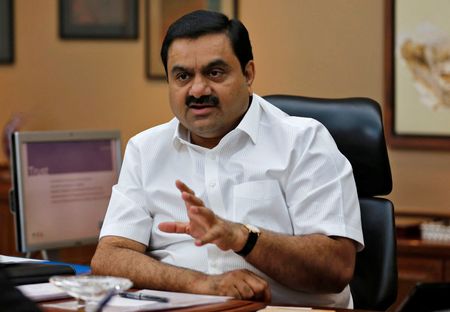By Shivam Patel, Aditi Shah and Aditya Kalra
NEW DELHI (Reuters) – India’s Gautam Adani, the school dropout who rose to become one of the world’s richest men, suffered a stunning defeat when his flagship firm withdrew a blockbuster share sale after an attack by a small U.S. investment firm over his business practices.
The move came after Adani’s companies lost nearly $86 billion in the stock market as investors bailed out on the tycoon who built a conglomerate spanning ports, coal mines, food businesses, airports and lately media.
On Tuesday, the Adani group appeared to have fought back the attack by the New York-based short-seller Hindenburg and rallied investors behind the $2.5 billion share issue of flagship firm Adani Enterprises.
But Adani could not staunch the sell-off in the market with Adani Enterprises, the crown jewel, losing more than a quarter of its value, saddling the investors who took part in his issue with huge paper losses.
It was a rare defeat for a man who has seemed unstoppable in recent years.
Adani, from Gujarat in western India, built his empire from scratch after starting out as a commodities trader. India’s Prime Minister Narendra Modi is from the same state and their relationship has long come under scrutiny by Modi’s opponents.
Until last week, Adani was the world’s third-richest person, according to Forbes, with a net worth of $127 billion, trailing only Bernard Arnault and Elon Musk. On Thursday, he had slipped to 16th rank as market losses in his companies hit $100 billion.
GRAPHIC: Gautam Adani slips to world’s eighth richest person – https://www.reuters.com/graphics/ADANI-INDIA/HINDENBURG-NETWORTH/akpeqadbbpr/chart.png
Married to dentist Priti Adani, he has two sons, Karan and Jeet, both of whom are involved in the company businesses.
Despite his riches, the 60-year-old, who comes from a middle-class textile family, was far lesser known than other billionaires in a country where many inherit their wealth.
His business style was described as “very hands on”, according to one person with direct knowledge of his dealings.
As Adani’s empire swelled, stocks of his seven listed companies surged – in some cases more than 1,500% in the last three years amid aggressive expansion. He denied allegations by Modi’s opponents that he had benefited from their close ties.
In recent years, the $220 billion Adani Group empire has attracted foreign investment – France’s TotalEnergies, for example, partnered with Adani last year to develop the world’s biggest green hydrogen ecosystem.
More recently, Adani has taken a proactive approach to his public image, giving interviews to local and foreign media.
Appearing in a popular Hindi TV show last month called the ‘People’s Court’, Adani sat in a mock witness box inside a courtroom setup and answered questions about his conglomerate – offering an unusual level of scrutiny.
He described himself as “a shy person” and credited the rise of his popularity in part to the political attacks he has faced.
Modi’s government has denied allegations of favouring Adani.
FIGHT WITH SHORTSELLER
Faced with a scathing attack by Hindenburg over the use of offshore entities in tax havens and its debt levels – estimated at $23.34 billion by Jefferies – the Adani group mounted a stout defence in a 413-page response.
It said the report was a “calculated attack” on India and its institutions. A senior executive compared the rout of its stocks with a colonial-era massacre saying investors were behaving like the Indian soldiers who fired on fellow-citizens under orders from British rulers.
Many Indians later voiced their support for the beleaguered businessman on social media. “IndiaStandsWithAdani” was among the top trending hashtags on Twitter.
As the losses mounted in the market this week, Adani himself appeared unfazed. He landed in Israel to take formal control of Haifa port that he had bought earlier in partnership with a local firm. He promised further investments in Israel at the event also attended by Israeli Prime Minister Benjamin Netanyahu.
Adani is no stranger to controversy. The most recent was months of protest by fishermen against construction of a $900-million port in southern India’s Kerala, in which he sued the state government and fishermen leaders. And in Australia, environmental activists for years protested against Adani’s Carmichael coal mine project in Queensland on concerns of carbon emissions and damage to the Great Barrier Reef.
On Wednesday, Adani said his company felt it wasn’t “morally correct” to proceed with the share sale following the volatility in the market. But he said in a statement to the exchange the company was financial stable and that the withdrawal of the share issue will not impact its future plan.
(Reporting by Shivam Patel, Aditi Shah and Aditya Kalra in New Delhi; Additional reporting by Nikunj Ohri in New Delhi and Chris Thomas in Bengaluru; Editing by Sanjeev Miglani, Nick Zieminski and Muralikumar Anantharaman)

